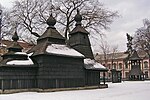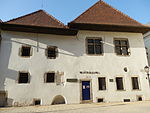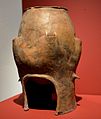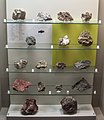East Slovak Museum
Východoslovenské múzeum | |
 | |
 | |
| Established | 1872 |
|---|---|
| Location | Košice, Slovakia |
| Collection size | 500,000 [1] |
| Website | www |
The East Slovak Museum (Slovak: Východoslovenské múzeum) in Košice, Slovakia, is one of the oldest Slovak museums, founded in 1872. It is located in the Old Town borough of Košice, at Námestie maratóncov (Marathon Runners' Square).
The museum was founded on 25 June 1876 as Felső-Magyarországi Muzeum (Museum of Upper Hungary), in the Kingdom of Hungary. In 1906, it was renamed to Felső-magyarországi Rákóczi Múzeum after the reburial of Francis II Rákóczi.
A neo-Renaissance building was erected in the early 20th century. It was the first building in the town designed to serve its needs as a museum. There are sculptures of Perseus and Vulcan on the facade of the building.[citation needed]
The museum also possesses a relocated wooden church that was built in 1741.[2]
Exhibits
[edit]The main museum building is located at Marathon Runners' Square in central Košice, just outside the Old Town's traditional northern boundary. It serves as the headquarters of the institution, housing several permanent exhibits. It also features a great number of exhibition spaces for temporary exhibits pertaining to history, archaeology, fine arts, historical photography, biology and nature, and other related topics. Temporary exhibitions in the museum tend to last several weeks or even months.
The current number of permanent exhibitions in the main museum underwent a general overhaul in the early-to-mid 2010s, during the main museum building's biggest maintenance renovation in its history. The renovation lasted from September 2008 to September 2013.[3]
In addition to the main museum building, the museum has further branch exhibits in other parts of the Old Town borough, such as the permanent exhibits on nearby Hviezdoslavova Street, the permanent exhibits on Pri Miklušovej väznici and Stará Baštová streets, the specialised exhibition spaces on Hrnčiarska Street, and others.
The following sections provide an overview of the museum's main exhibits, both current and former.
Current exhibits
[edit]Exhibits and exhibition spaces currently operated by the museum.
| Image | Exhibit name | Type | Contents | Location | Notes |
|---|---|---|---|---|---|
 |
Košice Golden Treasure [4] | Permanent exhibit | Late-medieval and early modern treasure of golden coins and golden jewellery, excavated in the 1930s. Includes period coins from Hungary and many countries from all around Europe. | Námestie maratóncov 2 | The treasure was discovered in August 1935. This exhibit has a long tradition in the museum, the latest iteration opened in the 2010s. |
 |
Wooden church of St. Nicholas from Kožuchovce [5] | Permanent exhibit | East Carpathian wooden church and wooden belfry, originally from the village of Kožuchovce. | Námestie maratóncov 2 | Transferred to Košice in the 20th century. Located in the park on the grounds of the main building. |
 |
Centuries of Art [6] | Permanent exhibit | Art history, historical artistic artefacts (religious as well as secular) and fine arts. | Hviezdoslavova 3 | Branch exhibit on Hviezdoslavova Street. |
 |
The Nature of the Carpathians [7] | Permanent exhibit | Natural history exhibit, geology, paleontology and zoology collections. Focused mainly on the Slovak Carpathians and east Slovakia. | Hviezdoslavova 3 | Branch exhibit on Hviezdoslavova Street. |
 |
The Košice Centuries [8] | Permanent exhibit | Medieval and early modern history of the city. | Pri Miklušovej väznici 10 | Branch exhibit on Pri Miklušovej väznici Street. Located inside Mikluš's Prison, an old city prison derived from two medieval townhouses. |
 |
Medieval Fortifications of the City of Košice - Casemate [9] |
Permanent exhibit | Medieval and early modern fortifications of Košice. | Hrnčiarska 7 | Branch exhibit on Hrnčiarska Street. Housed mostly in the Executioner's Bastion. |
 |
Rodošto - Memorial House of Francis II. Rákóczi [10] | Permanent exhibit | Replica of the house in which Francis II Rákóczi lived during his years in Ottoman exile (1720-1735). | Hrnčiarska 7 | Branch exhibit on Hrnčiarska Street. The exhibit was updated in 2013. |
 |
The House of Crafts [11] (Dom remesiel) |
Exhibition space | Intended for longer-lasting temporary exhibitions on Košice's history of crafts and industries. | Hrnčiarska 9/A | Branch exhibit on Hrnčiarska Street. The latest exhibit, opened in 2013. |
Former exhibits
[edit]Major exhibits and exhibition spaces operated by the museum in the past. No longer in existence, administered by different museums in the present or developed into separate museums. Listed in rough chronological order, based on date of founding.
| Image | Exhibit name | Type | Contents | Location and duration |
Notes |
|---|---|---|---|---|---|
 |
First historical exhibit at the Červený Kláštor monastery (1966) [12] | Permanent exhibit | An exhibit focused on the history of the monastery, including its role in pharmacy history and research. The first exhibit of its kind in Červený Kláštor. | Červený Kláštor monastery in Červený Kláštor From 1966 until ca the 1980s. |
Established in 1966 as the first museum exhibit on the monastic and research history of the monastery. The Červený Kláštor exhibit was later moved under the administration of the Ľubovňa Museum in Stará Ľubovňa (1999-2007), which continued the modernisation and expansion of the exhibits. Most recently, since 2008, the monastery's exhibits were further refurbished, and the whole museum is now administered by the Monuments Board of the Slovak Republic. |
 |
Artistic Metal-founding in East Slovakia (1977) [13][14] | Permanent exhibit | An exhibit focused on the history and aspects of bell-forging, bell-founding and general utilitarian iron-forging, foundry and smithing crafts. The St Urban Tower on the main square was chosen for its connection to the city's famous bell of St Urban. | St Urban Tower Main Street in Košice 1977-1994 |
The tower's most recent historical bell, the bell of St Urban, was created in the 17th century and damaged by a fire in 1966. This original bell was eventually restored and displayed in front of the tower by the early 1990s and a replica was developed and installed in the tower itself in 1996, after the cancellation of the exhibit in 1994. Since 2004, the tower was used for the private Wax Museum of Košice, which showed Košice's historical personalities and operated for about a decade. |
Gallery
[edit]Main building (exterior and interior views)
-
The museum in 1912 (period postcard)
-
The entrance facade during daytime (2005)
-
Museum at night time (July 2013)
-
Museum at night time (December 2014)
-
Decorated handrails of the main staircase
Wooden church of St. Nicholas and belfry (museum park)
-
The wooden church of St. Nicholas, originally from Kožuchovce
-
The wooden church of St. Nicholas, originally from Kožuchovce
-
The wooden belfry and church from Kožuchovce
-
The wooden belfry from Kožuchovce
Archaeological collections
-
Portable clay stove of the Ottomány culture
-
Iron Age Celtic pottery (2nd century BC)
-
Roman era ceramic pot
-
Roman era pottery stove
-
Vandalic ceramic bowl (3rd century AD)
Period furniture collections
-
A historical wedding chest
-
Folk art interior, typical of Abov county
-
Historical pharmacy display in the East Slovak Museum
-
Art Nouveau interior
Art history exhibit (Hviezdoslavova Street)
-
Medieval book by anonymous miniaturist from Delft
-
Medieval religious miniature by anonymous miniaturist from Italy
-
Sculpture of St Martin
-
Painting from the 1820s
Natural history exhibit (Hviezdoslavova Street)
-
Mineral exhibit
-
Various minerals found in east Slovakia
-
Various minerals found in east Slovakia
-
Various minerals found in east Slovakia
-
Apophyllite, mangano calcite and stilbite
-
Wooden opal from east Slovakia
-
Archaeopteryx fossil
-
Mammoth bones
Fortifications exhibit, Rodošto memorial house and House of Crafts
-
Entrance gate to the Executioner's Bastion complex and courtyard
-
The entire courtyard at the Executioner's Bastion and Rodošto memorial house
-
Period cannon at the exhibit's courtyard
-
Park near Rodošto memorial house and a section of the city walls
-
Rodošto memorial house (foreground) and House of Crafts exhibit (background)
-
House of Crafts front entrance from further up Hrnčiarska Street
See also
[edit]- Slovak Technical Museum (Main Street, Košice Old Town)
- East Slovak Gallery (Main Street, Košice Old Town)
References
[edit]- ^ "History of the East Slovak Museum (with reference to the current number of collections)". East Slovak Museum Košice (Old Town). Retrieved 6 January 2019.
- ^ "East Slovak Museum". Košice / Slovakia. Lonely Planet. Retrieved 15 May 2016.
- ^ "After five years of reconstruction, the museum building will reopen". kosice.korzar.sme.sk. Korzár Košice. 12 September 2013. Retrieved 6 January 2019.
- ^ "Košice Golden Treasure". vsmuzeum.sk. East Slovak Museum Košice (Old Town). Retrieved 7 January 2019.
- ^ "Small wooden church from Kožuchovce". vsmuzeum.sk. East Slovak Museum Košice (Old Town). Archived from the original on 3 April 2017. Retrieved 7 January 2019.
- ^ "Centuries of Art (art history permanent exhibit)". vsmuzeum.sk. East Slovak Museum Košice (Old Town). Retrieved 6 January 2019.
- ^ "The Nature of the Carpathians (natural history permanent exhibit)". vsmuzeum.sk. East Slovak Museum Košice (Old Town). Retrieved 6 January 2019.
- ^ "The Košice Centuries (medieval and early modern city history permanent exhibit)". vsmuzeum.sk. East Slovak Museum Košice (Old Town). Archived from the original on 6 January 2019. Retrieved 6 January 2019.
- ^ "Medieval Fortifications of the City of Košice - Casemate". vsmuzeum.sk. East Slovak Museum Košice (Old Town). Archived from the original on 6 January 2019. Retrieved 6 January 2019.
- ^ "Rodošto - Memorial House of Francis II. Rákóczi". vsmuzeum.sk. East Slovak Museum Košice (Old Town). Archived from the original on 16 February 2020. Retrieved 7 January 2019.
- ^ "The House of Crafts (exhibit of historical crafts and industries in the city)". vsmuzeum.sk. East Slovak Museum Košice (Old Town). Retrieved 6 January 2019.
- ^ "Múzeum Červený Kláštor - Múzeum (Červený Kláštor Museum - About the Museum)". Červený Kláštor Museum official website. Červený Kláštor Museum. Retrieved 6 January 2019.
- ^ "Article on St Urban Tower that also describes the former, cancelled metal-founding exhibit". keturist.sk. KEturist.sk. Retrieved 6 January 2019.
- ^ "Umelecké kovolejárstvo na východnom Slovensku (brief older tourism article about the exhibit)". nocowanie.sk. Nocowanie.sk. Retrieved 6 January 2019.






































